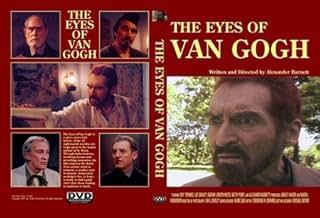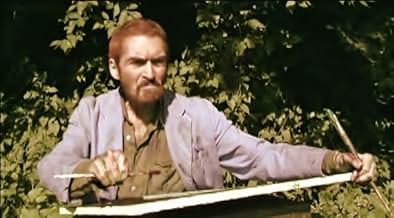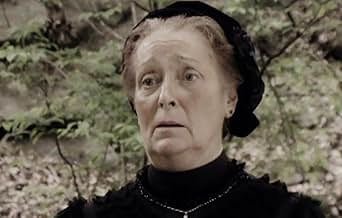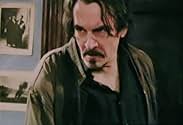अपनी भाषा में प्लॉट जोड़ेंAfter the disastrous months spent with Gauguin in the yellow house in Arles, Vincent van Gogh, in desperate search for a cure from attacks that increasingly plague him, voluntarily enters an... सभी पढ़ेंAfter the disastrous months spent with Gauguin in the yellow house in Arles, Vincent van Gogh, in desperate search for a cure from attacks that increasingly plague him, voluntarily enters an insane asylum.After the disastrous months spent with Gauguin in the yellow house in Arles, Vincent van Gogh, in desperate search for a cure from attacks that increasingly plague him, voluntarily enters an insane asylum.
- पुरस्कार
- 1 जीत और कुल 1 नामांकन
Diana Agostini
- Kee Vos
- (as Diane Agostini)
फ़ीचर्ड समीक्षाएं
10jfischet
The "Eyes of Van Gogh" was a captivating and depressing portrayal of Van Gogh's final days. I always viewed Van Gogh as an excellent artist with a slightly disturbing life. I clearly did not understood neither the full extent of his despair. From the beginning, it's very clear that Van Gogh is captive to his dark, depressing hallucinations caused by a difficult and lonely life. In fact, it seems as if Van Gogh's life was just one disappointment after another. Friendless, loveless, and entirely dependent upon his brother for living, Van Gogh was not the successful artist that I always imagined him to be. One cannot help but feel sorry for a man whose parents blamed him for the death of his brother, whose true love cruelly rejected him, and whose beautiful paintings were ridiculed by the artistic elite. Such rejection and cruelty would drive anyone crazy.
The drab scenery and music were key to setting the overall tragic setting of this movie. Also, the confusion experienced deciphering actual events from make-believe ones helps one to understand Van Gogh's delirium during his days in the Insane Asylum. It is very fitting that Van Gogh dies soon after he is forbidden from the one activity that brings him joy, painting. The viewer is left with the impression that without art, Van Gogh really had nothing left to live for.
The drab scenery and music were key to setting the overall tragic setting of this movie. Also, the confusion experienced deciphering actual events from make-believe ones helps one to understand Van Gogh's delirium during his days in the Insane Asylum. It is very fitting that Van Gogh dies soon after he is forbidden from the one activity that brings him joy, painting. The viewer is left with the impression that without art, Van Gogh really had nothing left to live for.
Having seen some of Barnett's earlier work on stage in N.Y., I was more than familiar with the depth and breadth of his ability as an actor and director; how seemingly effortlessly he brings each of his characters to life. I was fully prepared to be equally moved by his interpretation and portrayal of Vincent van Gogh. I knew that Barnett could be electrifying on stage and I was curious to see how his energy would translate on film.
Nothing, however, prepared me for the emotional shock I experienced by his haunting rendering of the most tortured months in the life of van Gogh. The intensity that Barnett brought to this role can only be described as "insane." One can but imagine the years of research and total immersion into the life of van Gogh it must have required to be able to portray with such shocking clarity what was in van Gogh's heart and mind during this brief period of time. Another commenter describes Barnett's performance as, "as close to insanity as you will ever get." I agree.
The film is not highly polished in the typical sense. The lighting is poor at times, the sets and scenery drab, and while I know nothing about film editing, I found some of the flashbacks unnecessarily confusing. These perceived flaws could be due to budget constraints, but knowing something of Barnett's work, I tend to think there is some intention on his part. The overall effect is that the viewer experiences the bleakness that is Vincent's life at the time. At times in the film, what is reality and what is only in van Gogh's tortured and clouded mind is as indistinguishable to the viewer as it is to Vincent, making the viewing experience all the more haunting and disquieting. An amazing feat, whether intentional or not.
Nothing, however, prepared me for the emotional shock I experienced by his haunting rendering of the most tortured months in the life of van Gogh. The intensity that Barnett brought to this role can only be described as "insane." One can but imagine the years of research and total immersion into the life of van Gogh it must have required to be able to portray with such shocking clarity what was in van Gogh's heart and mind during this brief period of time. Another commenter describes Barnett's performance as, "as close to insanity as you will ever get." I agree.
The film is not highly polished in the typical sense. The lighting is poor at times, the sets and scenery drab, and while I know nothing about film editing, I found some of the flashbacks unnecessarily confusing. These perceived flaws could be due to budget constraints, but knowing something of Barnett's work, I tend to think there is some intention on his part. The overall effect is that the viewer experiences the bleakness that is Vincent's life at the time. At times in the film, what is reality and what is only in van Gogh's tortured and clouded mind is as indistinguishable to the viewer as it is to Vincent, making the viewing experience all the more haunting and disquieting. An amazing feat, whether intentional or not.
History tells us that Van Gogh, like many artists, was a very intense and troubled personality. Barnett takes us into the heart and mind of the man in a way that causes us to empathize afresh with his feelings and struggles. Barnett the film-maker deliberately refrains from any cutting from one camera to another, enhancing the viewer's being drawn into the world as viewed from Van Gogh's perspective. The score is also effective in painting an aural picture of what is going on inside the artist's mind. In this film we see Van Gogh, not just as a troubled soul, but as a sensitive and caring person who never quite found the way to break free of the demons from his past that haunted him up to the end of his life. Barnett's portrayal of Van Gogh is both believable and engaging. Despite the film's length of almost two hours, it holds the viewer's attention and moves the heart.
This movie will stir your soul. Barnett draws us in, leaving us emotionally drained, as he brings to life Vincent's struggles and what must have been his tortured state of mind during those dark years. We are immersed into Vincent's mind.
Also noteworthy, Roy Thinnes'performance as Dr. Peyron.
I thought the sets and costuming were too drab but that did not deter from the, at times, riveting performances on screen.
All in all, this is a noteworthy work. Hope to see more of Barnett on film. He comes across as well on film as he does on stage.
Would love to see some of his earlier work come alive on the screen.
Also noteworthy, Roy Thinnes'performance as Dr. Peyron.
I thought the sets and costuming were too drab but that did not deter from the, at times, riveting performances on screen.
All in all, this is a noteworthy work. Hope to see more of Barnett on film. He comes across as well on film as he does on stage.
Would love to see some of his earlier work come alive on the screen.
Biographical films are problematic - especially the ones about artists. Not just painters. Any artist. Generally, I find them simplistic, sentimental or sleazy - on occasion all three at the same time. Often, the casting is silly. That is not the case here.
What's most important to me in a film is the acting and the writing. I agree with the other reviewers for the most part. Both are excellent in The Eyes of Van Gogh - most especially that of Mr. Barnett as Vincent, who is riveting and amazingly well cast. He also wrote the film script.
I was disappointed by the actor who played Theo - not that I've liked others who have played van Gogh's brother. But here - in the writing - he had an opportunity to show the torment Theo also must have experienced and could not manage it. I believe he died of brain fever shortly after Vincent died. Even though that is not part of this portion of van Gogh's life in the film, we should have sensed that coming. The actors playing the other roles were just fine - including many of the small ensemble.
This was obviously a labor of love for Alexander Barnett and I salute him.
What's most important to me in a film is the acting and the writing. I agree with the other reviewers for the most part. Both are excellent in The Eyes of Van Gogh - most especially that of Mr. Barnett as Vincent, who is riveting and amazingly well cast. He also wrote the film script.
I was disappointed by the actor who played Theo - not that I've liked others who have played van Gogh's brother. But here - in the writing - he had an opportunity to show the torment Theo also must have experienced and could not manage it. I believe he died of brain fever shortly after Vincent died. Even though that is not part of this portion of van Gogh's life in the film, we should have sensed that coming. The actors playing the other roles were just fine - including many of the small ensemble.
This was obviously a labor of love for Alexander Barnett and I salute him.
क्या आपको पता है
- ट्रिवियाIn 2015, the Van Gogh Museum in Amsterdam will commemorate the 125th anniversary of van Gogh's death. They will be showing clips from the film The Eyes of Van Gogh throughout the year.
- भाव
Vincent van Gogh: I must finish my work.
टॉप पसंद
रेटिंग देने के लिए साइन-इन करें और वैयक्तिकृत सुझावों के लिए वॉचलिस्ट करें
विवरण
- चलने की अवधि
- 1 घं 51 मि(111 min)
- रंग
इस पेज में योगदान दें
किसी बदलाव का सुझाव दें या अनुपलब्ध कॉन्टेंट जोड़ें













